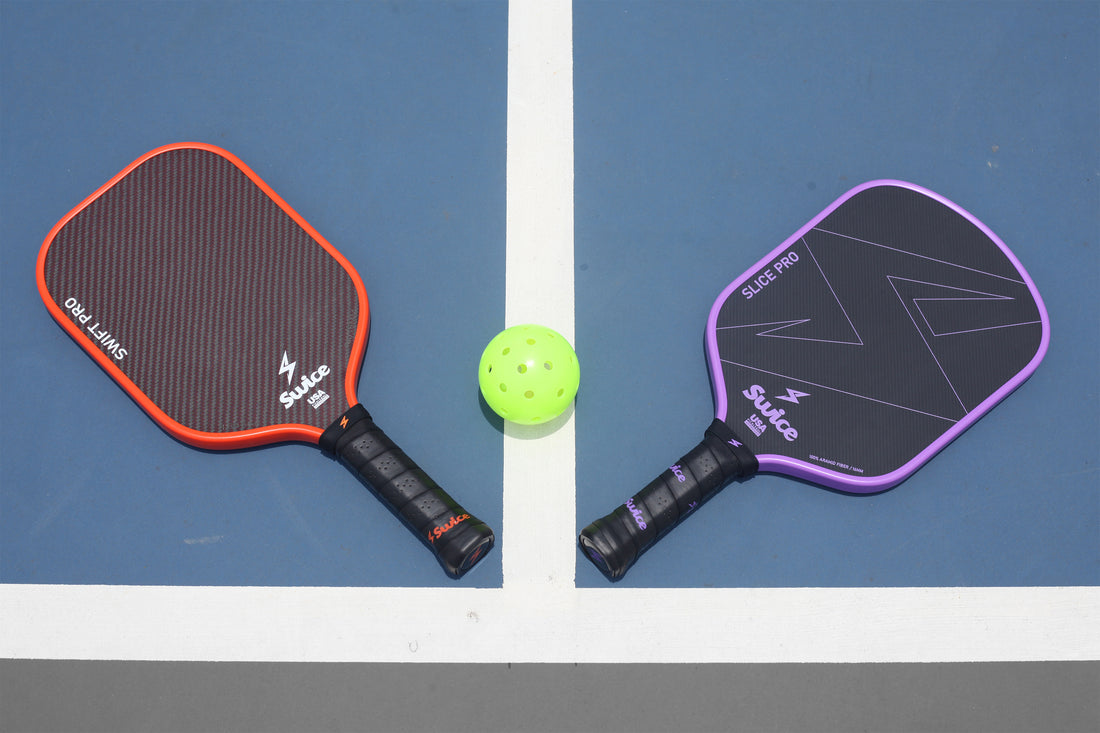How to know whether a power, control, or hybrid paddle is best for you
Pickleball paddles for power players
Power players dominate the court with force and velocity, delivering hard, fast shots that challenge their opponents' reaction time. These players maximize their strength and swing speed by leveraging their equipment.Characteristics of a Power Paddle
Power paddles are designed to support the fast-paced game that power players crave. They enhance the speed and impact of shots but may require more effort for controlled, precise plays.
Core Thickness: Typically around 13 mm or less. This thinner core creates a stiffer surface, enhancing power.
Weight: Heavier paddles, weighing 8.0 ounces or more, harness greater mass to generate forceful hits. Some players add lead tape for extra power.
Paddle Shape: Longer paddles provide additional reach and leverage, resulting in more powerful swings.
Paddle Face: Durable materials like fiberglass and carbon fiber aid in delivering potent strikes.
Handle Length: Extended handles support two-handed backhands and shift the sweet spot further from the handle, offering more reach and leverage for forceful swings.
Recommended power paddle
Swice offers the Swift Pro at a reasonable price for power players. The Swift Pro is an excellent choice for enhancing swing power and on-court dominance.
Pickleball Paddles Designed for Control Players
Control players excel in strategy and precision, preferring to outsmart their opponents with meticulously placed shots. Their playing style is defined by precision and accuracy, relying on skillful ball placement over brute force.
Characteristics of a Control Paddle
Control paddles are designed for players who prefer finesse in their game. They typically feature a thicker core, a larger sweet spot, and materials that reduce the pace of the ball. While they support more controlled shots, control paddles require more force to generate powerful putaway shots.
- Core Thickness: Typically about 16 mm or more. A thicker core absorbs energy, allowing for precise, controlled shots.
- Weight: Lighter paddles, usually around 7.5 ounces or less, offer superior maneuverability.
- Paddle Shape: Shorter and wider designs create a larger sweet spot, facilitating better ball control.
- Paddle Face: Materials like graphite and carbon fiber absorb impact and provide more precise shots.
- Handle Length: Shorter handles bring the sweet spot closer to the player's hand, enhancing maneuverability.
Hybrid pickleball paddles for players who seek a balance between control and power.
Hybrid players are versatile, adapting their play style to the dynamics of each game. They strike a balance between power and precision, making them unpredictable and flexible competitors.
Characteristics of a Hybrid Pickleball Paddle
Hybrid paddles incorporate a balanced approach, featuring intermediate specs from both power and control designs.
1. Core Thickness:
Hybrid paddles typically have a core thickness that provides a moderate level of energy absorption and power delivery, measuring around 14-15 mm. This thickness helps absorb energy from opponents’ fast shots while allowing players to generate power.
2. Weight:
Hybrid pickleball paddles often fall in the midweight category, usually around 7.8 ounces. This weight provides enough force on shots while maintaining maneuverability for precise placement.
3. Paddle Shape:
The shape of hybrid paddles varies, offering a mix of paddle face shape and handle length. For instance, they may feature a shorter, wider paddle face designed for control and a longer handle for power, or vice versa — an elongated paddle face with a shorter handle.
4. Paddle Face:
Hybrid paddles often combine multiple materials such as carbon fiber, fiberglass, and graphite to create a neutral surface that balances power and control.
5. Handle Length:
Handle length varies on hybrid paddles, catering to different player preferences. A longer handle is advisable for players who prefer two-handed backhands, while a shorter handle offers extra maneuverability.
6. Overall Performance:
Hybrid paddles strike a balance between power and control, offering a versatile option for players who adapt their play style to different game dynamics. They provide a middle ground in terms of power and control, making them suitable for unpredictable and flexible competitors.
How to Choose the Right Paddle
1. Assess Your Playing Style:
- Aggressive Players: If you like to dominate with powerful shots, a power paddle may be the best fit.
- Defensive or Tactical Players: If you prefer precision and finesse, a control paddle will likely suit your needs.
- Versatile Players: If you switch between aggressive and defensive strategies, a hybrid paddle might be ideal.
2. Evaluate Your Skill Level:
- Beginners: Often benefit from control paddles, as they help with learning proper shot placement and control.
- Intermediate and Advanced Players: Can experiment with power or hybrid paddles based on their refined playing styles.
3. Consider Physical Factors:
- Strength and Endurance: Choose a paddle weight that you can handle comfortably over long periods.
- Arm and Wrist Health: Heavier paddles can strain your arm and wrist, so consider lighter options if you have any concerns.
4. Test Different Paddles:
- Demo Programs: Many retailers and pickleball clubs offer demo programs where you can try different paddles before making a purchase.
- Feedback and Reviews: Read reviews and ask for feedback from other players to gather insights about different paddles.
Conclusion
Choosing the right pickleball paddle—whether power, control, or hybrid—depends on understanding your playing style, skill level, and physical capabilities. Power paddles suit aggressive players looking to dominate with forceful shots, while control paddles cater to those who prioritize precision and finesse. Hybrid paddles offer a versatile option for players who want a balanced performance. By assessing your needs and testing different paddles, you can find the perfect match to enhance your game and enjoyment on the court.




